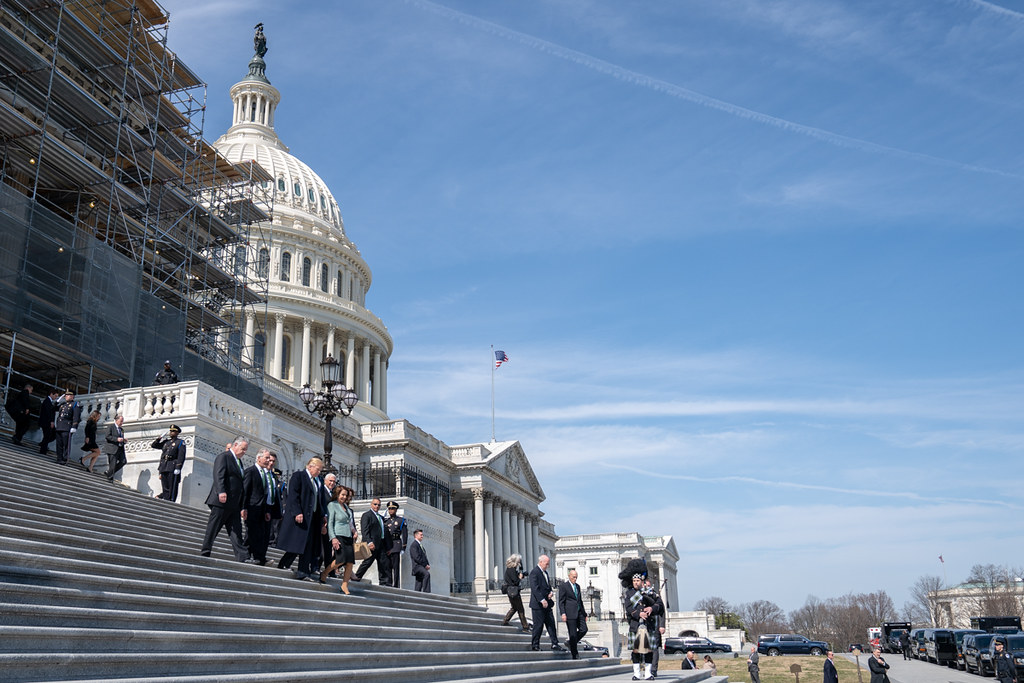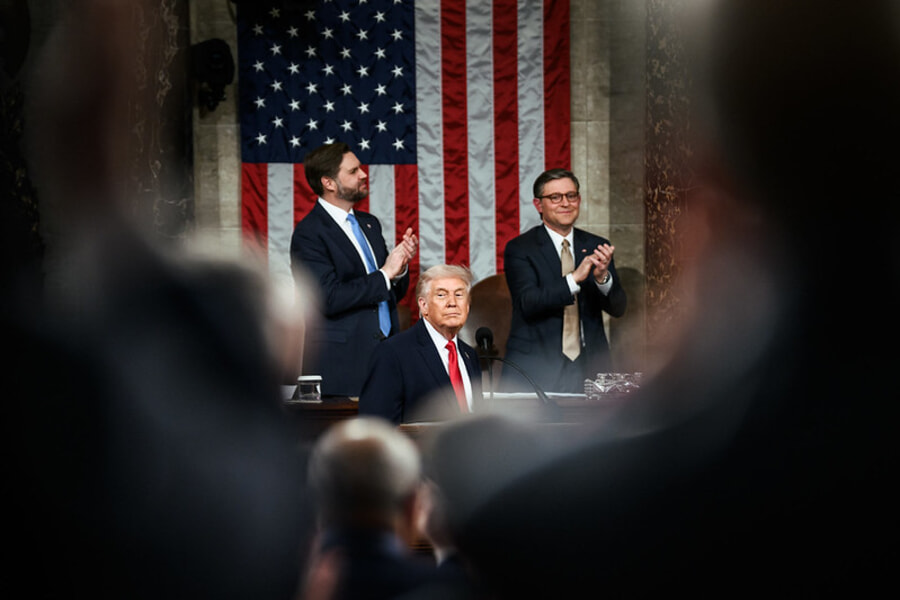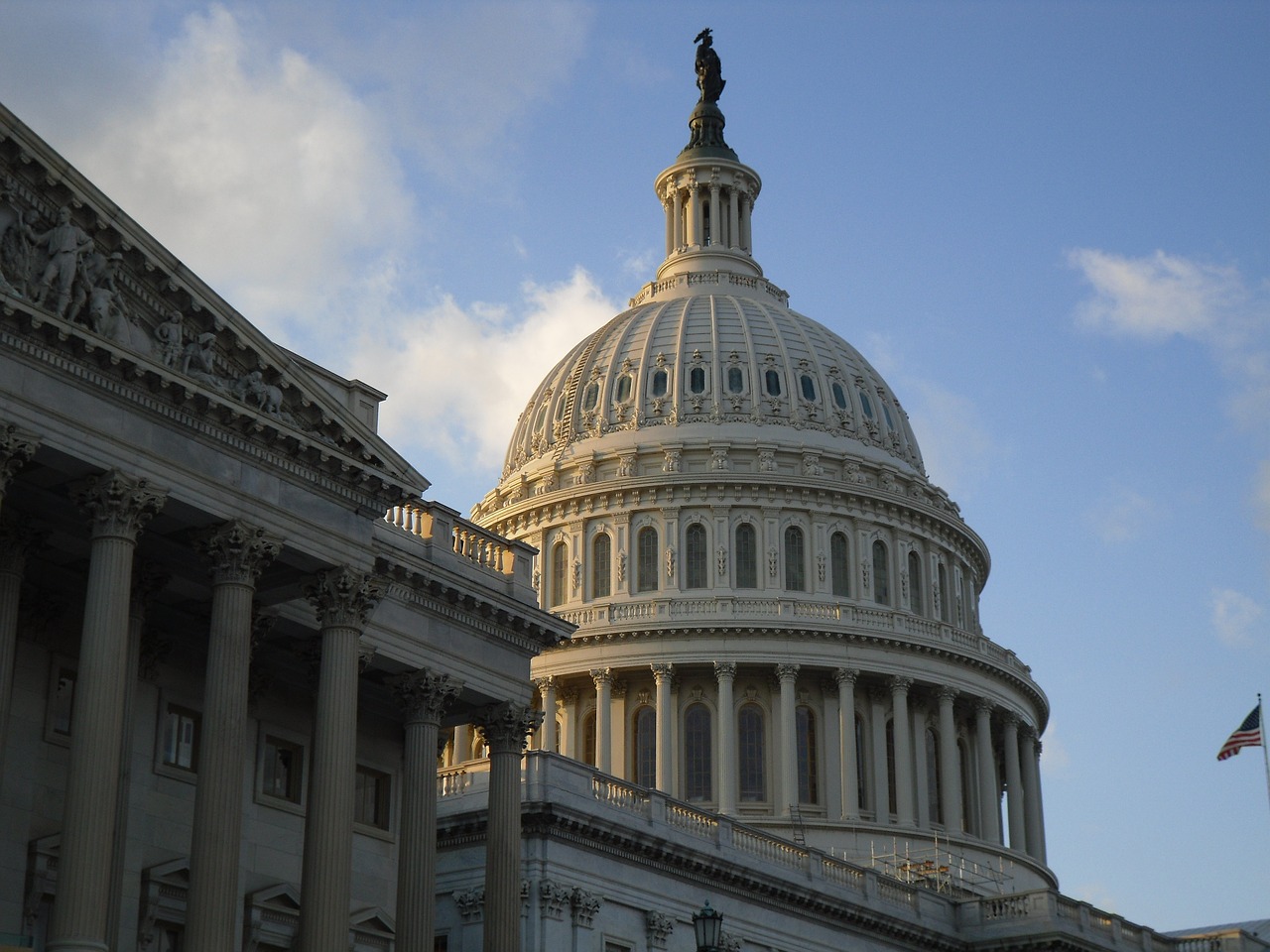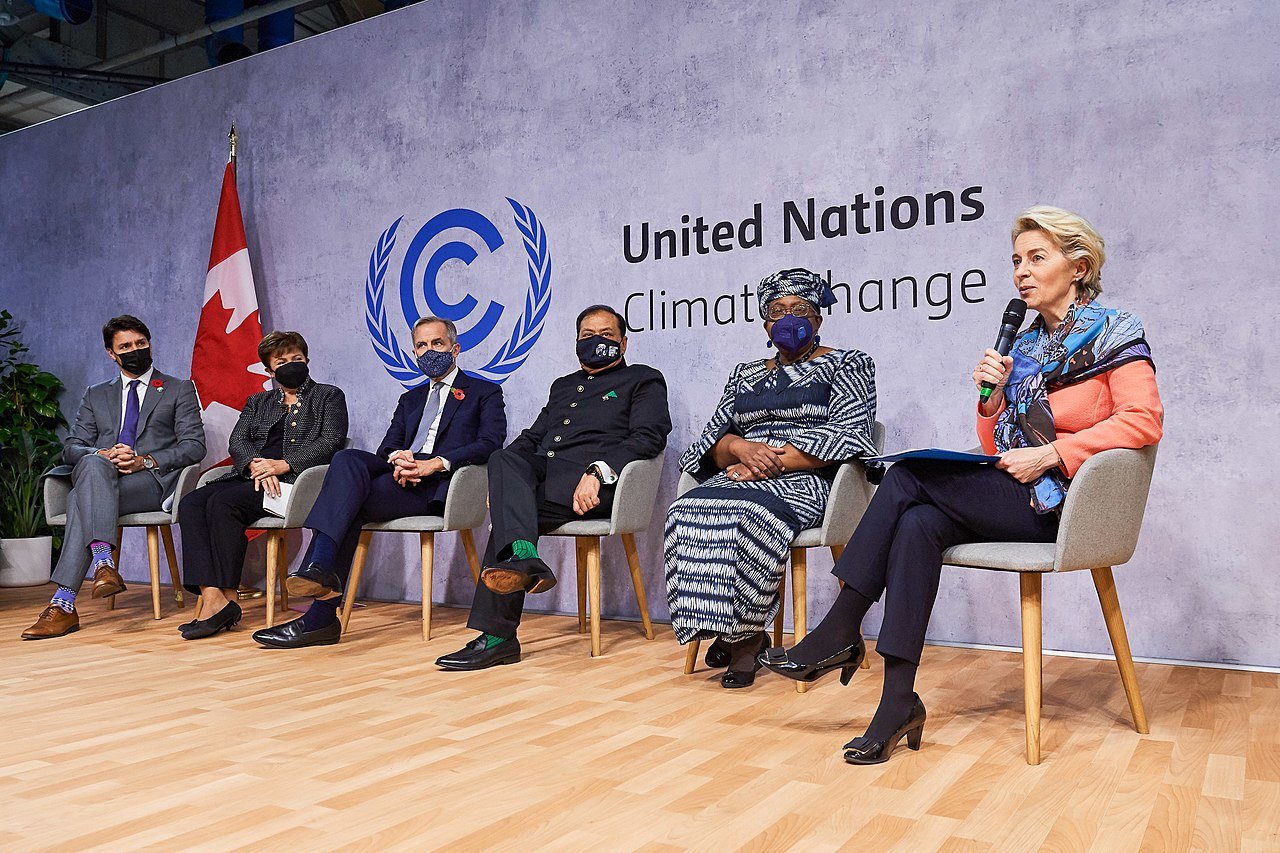'Masters From Two Equal Branches of Government': Trump and Congress Play Hardball
President Trump proclaimed recently that his administration would be “fighting all the subpoenas.” And the headlines are filled with the proliferating disputes between the Democratic-controlled House and the administration.

President Trump proclaimed recently that his administration would be “fighting all the subpoenas.” And the headlines are filled with the proliferating disputes between the Democratic-controlled House and the administration. According to CNN, the Democrats have declared they will take the disputes “to the courts,” even though, as several scholars quoted in the article note, the courts are not likely to resolve anything quickly, or perhaps ever.
Yet the constitutional explanations provided so far by the administration are not necessarily a “radical departure” from past practice—or even novel or unique to the Trump administration. They arise out of long-held positions of the executive branch adopted, at least in part, by administrations of both parties. Ultimately, these conflicts arise out of the fundamentally different views held by the executive branch and Congress about their respective constitutional authorities in the context of congressional oversight. And, importantly, the current battles illustrate in a very public way the executive branch’s expansive view of executive privilege.
Congressional oversight is defined by the Congressional Research Service as the “review, monitoring, and supervision of the implementation of public policy—of the executive branch.” And although Congress has engaged in various types of oversight throughout the nation’s history, the Congressional Research Service notes that it was not until the last half of the 20th century that oversight became a primary focus of Congress. The constitutional issues that have arisen related to congressional oversight are thus somewhat recent as a historical matter, and they are continually evolving. Moreover, the Supreme Court and other appellate courts have had few opportunities to address these issues—and almost no opportunities outside of Watergate-related disputes—leaving a dearth of precedent to guide the two branches in these disputes.
As a career attorney in the Office of Legal Counsel (OLC) at the Department of Justice, I focused primarily on these somewhat arcane constitutional issues, working with career officials at the department and officials at the White House Counsel’s offices and agency counsels’ offices during the Obama administration and, more briefly, the Trump administration. We gave a lot of thought to the endgame and the bottom-line constitutional authorities of the two branches and debated the proper resolution of issues that could potentially arise out of a number of information disputes between the Obama administration and various House committees under Republican control. But, like most congressional oversight matters, almost every dispute was ultimately resolved through behind-the-scenes negotiation or largely petered out after the shift in control of the White House after the 2016 election.
Now, though, a litany of the most difficult and novel constitutional questions we worked on lurks behind each new headline. In recent days, both the deputy White House counsel and the attorney general have directed executive branch officials to refuse to comply with congressional subpoenas requiring the officials to sit for a deposition. And reports indicate that the White House intends to prevent former White House Counsel Don McGahn from testifying in compliance with the subpoena issued by the House Committee on the Judiciary and to fight similar attempts to depose other presidential aides. In his private and corporate capacity, President Trump has sued the chairman of the House Committee on Oversight and Government Reform, seeking to quash a subpoena sent to a third-party accounting firm for information about his businesses. And then there is that other issue about information redacted from the Mueller report.
Each of these disputes, along with other disputes such as the congressional request for Trump’s tax returns, implicates both normative practice between the branches and constitutional doctrines about the separation of powers and the potential limits of congressional oversight authority. But the administration’s recent directives for officials to refuse to comply with a congressional subpoena are particularly interesting, because they very publicly establish a new constitutional weapon in the executive branch’s oversight arsenal. And they illuminate the willingness—perhaps even the desire—of both the House and the administration to play constitutional hardball rather than seek potential accommodations. By engaging in hardball, the two sides may be teeing up a constitutional conflict that will finally bring clarity to the Constitution’s separation of powers in the context of congressional oversight. Or it may simply deepen the divide between the executive branch and Congress without providing any resolution.
Either way, these actions are undoubtedly establishing—for better or worse—new battle lines in the evolving conflict between Congress and the executive branch, lines that will likely remain even when the current actors have been replaced by new ones. A closer look at the administration’s actions with respect to the House oversight committee subpoenas illustrates both the historical grounding of these actions as well as their novelty. And it illuminates what this game of hardball may portend for the future of congressional oversight.
“Masters From Equal Branches of Government”
The same constitutional issue underlies the White House’s direction to former White House Personnel Security Director Carl Kline and Attorney General William Barr’s direction to Deputy Assistant Attorney General John Gore to refuse to comply with the House oversight committee subpoenas seeking their depositions. As Deputy White House Counsel Michael Purpura stated the administration’s position, the compelled deposition of Kline would “unconstitutionally encroach[] on fundamental Executive Branch interests” because the committee had indicated it would not allow a representative from the White House Counsel’s office to attend. The Justice Department similarly informed the committee that Gore would be directed not to appear by Barr because “the exclusion of agency counsel from a compelled deposition would unconstitutionally infringe upon the prerogatives of the Executive Branch.”
There is no doubt that the administration lawyers, including the White House Counsel’s office and the OLC, have collectively decided to adopt this position based on their view of the constitutional limits on congressional authority. And, despite what reports may say, the constitutional position is not entirely new. The Obama administration, for example, repeatedly objected to House committees’ attempt to depose officials without agency counsel present, and issued an opinion shortly before President Trump took office that noted the “constitutional concerns that may be raised by the Committees’ prohibition on attendance by counsel representing the agency.”
The dilemma presented by compelled depositions for the executive branch is relatively straightforward. The House oversight committee’s deposition procedures have long prohibited any “observers or counsel ... for agencies under investigation” from attending the deposition. An individual may have private counsel, but private counsel is bound to represent the interests of the individual, not the agency. And the committee is seeking information about the official acts of the agency and agency employees. So the deposition could potentially put an individual employee and his or her personal attorney in a bind. On one hand, the committee has issued a valid subpoena requiring the individual to answer questions under the threat of contempt. The official’s personal interests thus weigh in favor of responding. On the other hand, the executive branch claims that certain types of information—presidential communications, internal deliberations, sensitive law enforcement information, diplomatic communications and attorney-client information, to name the most prominent examples—are confidential and, ultimately, protectable from disclosure to Congress under the doctrine of executive privilege. The individual does not have the authority to waive that privilege, and agency regulations, called Touhy regulations after the Supreme Court case Touhy v. Ragen, prevent an official or employee from disclosing information relating to his or her official duties without authorization. The Justice Department Touhy regulations, for example, state that “no present or former employee of the Department of Justice may testify or produce Departmental records in response to subpoenas or demands of courts or other authorities issued in any state or federal proceeding without obtaining prior approval by an appropriate Department official.”
As the letter from Carl Kline’s attorney to the committee said, the individual is thus confronted by contradictory compulsory demands from “masters from two equal branches of government.” Kline has decided to “follow the instructions of the one that employs him,” and, under the Supreme Court’s decision in Touhy, the direction of that “master” is likely a defense to any contempt charge.
What is new is the act of directing an official to refuse to comply with a subpoena for a deposition on these grounds. I believe this is the first instance of an administration actually exercising that authority, though it undoubtedly has been discussed as a possibility in the past. And I am not aware of any scholarship or judicial precedent that directly addresses the issue; up until now, it has been a theoretical question. Touhy, for example, addressed only “the right of a subordinate official of the Department of Justice ... to refuse to obey a subpoena” issued by a court; it expressly declined to address the lawfulness of the attorney general’s order and the “ultimate reach of the Attorney General to refuse to produce at a court’s order the government papers in his possession.” And the statutory basis on which agency Touhy regulations originally rested—the Housekeeping Statute passed in 1789 by the First Congress, 5 U.S.C. § 301—was amended after Touhy to state clearly that it “does not authorize withholding information from the public or limiting the availability of records to the public.”
The administration’s position is that the Constitution requires a congressional committee to allow agency counsel to be present when the committee is questioning an executive branch official about official duties and actions of the agency. But to understand the basis for that position, one must first understand the executive branch doctrine of executive privilege—a term used often by elected officials and the media but usually in a manner quite different from the complex legal doctrine it represents within the executive branch.
The executive branch understands executive privilege in the context of congressional oversight not as an evidentiary privilege but as an implied constitutional authority belonging to the president to control dissemination of particular types of sensitive information. Because the privilege belongs to the president and president alone, a lower branch official cannot disclose information potentially protected by executive privilege unless and until authorized to do so by the president. In other words, the president must first determine whether to assert executive privilege. The result of that position is that executive branch officials, such as Attorney General Jeff Sessions in the current administration or Treasury Secretary Jack Lew in the Obama administration, repeatedly decline to provide information, citing executive privilege, despite the fact that no formal assertion has yet been made by the president. The information remains confidential because the president retains the authority to assert privilege, and the officer lacks authority to disclose it until that determination has been made.
In a deposition, unlike an information request, the executive branch does not know what questions will arise or what information the individual may be about to provide. If the testimony potentially implicates a component of executive privilege, then the executive branch view is that it needs to have its counsel in the room to monitor and protect that constitutional privilege. For example, if John Gore is asked about internal deliberations relating to the inclusion of the citizenship question on the census, agency counsel could step in and say he was declining to answer that question to preserve a possible executive privilege claim by the president.
In the executive branch view, if Congress may coerce an individual to divulge confidential information by threatening contempt before the president has an opportunity to determine whether to assert privilege, then the constitutional privilege offers little protection. The presence of agency counsel helps prevent that from happening and protects the constitutional privilege. As a result, the presence of agency counsel is an implied constitutional requirement necessary to protect the constitutional privilege of the executive branch. As the Purpura letter puts it, “without attending the deposition, this office cannot protect the constitutional equities of the Executive Branch, or ensure that the disclosure of any information subject to executive privilege is property authorized.”
The constitutional position is stated most clearly in the April 9 letter from Assistant Attorney General Stephen Boyd, on behalf of the Department of Justice, to the House oversight committee. The rule prohibiting counsel would “impermissibly infringe on the President’s authority to supervise the Executive Branch’s dissemination of information to Congress and to protect information within the scope of executive privilege.” The constitutional authority infringed is the authority to supervise dissemination, which applies even if no privilege has been asserted so long as the information is “within the scope” of executive privilege. And that position is not necessarily novel: The 2017 Obama administration opinion took pains to note in a footnote, without a need to do so, that a prohibition on agency counsel “could potentially undermine the Executive Branch’s ability to protect its confidentiality interests in the course of the constitutionally mandated accommodation process, as well as the President’s constitutional authority to consider and assert executive privilege where appropriate.”
The ultimate legal basis for the authority to issue the directives is thus grounded in the executive branch’s long-standing, but expansive, view of executive privilege. Congress, unsurprisingly, has a vastly narrower view of executive privilege as limited to presidential communications. But even if one agrees with the executive branch’s expansive view of executive privilege, or at least some aspects of it, it does not automatically follow that the directives are within the White House’s and Barr’s constitutional authority. The Supreme Court has recognized that “the separation of powers doctrine requires that a branch not impair another in the performance of its constitutional duties.” The entire doctrine of executive privilege originates in that doctrine, under the theory that the executive branch needs to maintain the confidentiality of particular types of information in order to perform its constitutional duties. The question, then, is whether the presence of agency counsel is necessary to protect executive privilege in this context or whether alternatives would suffice.
The administration’s decision that agency counsel is a constitutional necessity represents the next logical step in the constitutional one-upmanship that has characterized the actions of both branches over the past 30 years. And it comes in response to the House oversight committee’s decision to play constitutional hardball as well. The committee’s refusal to allow agency counsel to accompany Kline or Gore to a sworn voluntary interview, as opposed to a compelled deposition without agency counsel, is also a break from typical practice, particularly with respect to House oversight depositions.
In the past, the sides have usually, but not always, reached an accommodation that provided the sworn testimony sought by the committee but also allowed agency counsel to be present. Gore already appeared voluntarily for an interview, and Kline offered to appear voluntarily. But both declined, and would almost certainly continue to decline, to answer particular questions touching on areas protected by executive privilege. The reason to pursue a compelled deposition is to subject individuals to the threat of contempt for their noncompliance. The House oversight committee is, in other words, utilizing its constitutional authority to force the administration to provide information it believes may be protected by executive privilege by making individuals choose between the two “masters.” Although the House Republicans flirted with this tactic during the Obama administration, the House oversight committee has, in these two instances, begun using it more aggressively.
In a sense, the committee is calling, or attempting to call, the administration’s bluff. Executive branch practice is to not even consider an assertion of executive privilege until a committee is considering a contempt resolution. The development of an impasse leading to contempt typically takes a while when documents are at issue. But a deposition puts contempt on the table immediately. The committee has thus used the deposition as a way to make the executive branch decide more quickly whether to assert executive privilege or not.
But the administration has, in turn, adopted a more aggressive position to parlay that contempt threat. In the past, in the rare instances in which a committee insisted on a deposition without agency counsel, the executive branch has complied and utilized alternatives to protect its perceived constitutional interest. The Justice Department has noted in prior opinions that private counsel could be employed to act as agency counsel if agency counsel was not allowed. Or, the individual’s private counsel, who is allowed in a deposition, could be instructed that the government “master” was directing the individual not to discuss particular topics or answer particular questions. That private counsel may even be paid by and work with the agency to establish privileged areas and ensure the official or employee adheres to the direction of his or her employer. The agency counsel may sit outside the door or in the next room to be available for consultation if questions arise, an accommodation that committee offered to Kline. The executive branch official could presumably ask to consult with agency counsel next door on every question, thereby frustrating the intent of the committee and turning the deposition into a marathon.
The private counsel route was the one adopted by the Obama administration in the matter that led to the 2017 OLC opinion. The OLC determined that the Department of Health and Human Services (HHS) could use its appropriations to retain private counsel to represent an employee in her private capacity in a sworn deposition because doing so furthered governmental interests insofar as they were aligned with the employee’s personal interests. The OLC argued that because the deposition was in the employee’s official capacity, “the information at issue in her testimony is agency information” not personal information and “[t]he Executive Branch controls the dissemination of such information.” Accordingly, private counsel could work with HHS to “understand where the government’s confidentiality interests lie and what information the employee is authorized to disclose.” This alternative is not wholly satisfactory to the executive branch, which has objected consistently to the practice of excluding agency counsel for more than 30 years. But these alternatives would be lesser extremes than deploying the constitutional authority to direct an employee to refuse to comply with a congressional subpoena.
Unsatisfactory alternatives become even less appealing, however, if deposition subpoenas become commonplace and congressional committees make it a practice to refuse to accommodate agency counsel. And that is particularly true when an oversight war between the House and an administration is in its initial stages and battle lines drawn now will establish a precedent for future disputes. When Congress engages in hardball, particularly at the outset of a series of investigations, the executive branch has more motivation to play hardball in return and establish favorable precedents to which it will continually adhere. In this case, the administration has concluded that, as a constitutional matter, the presence of agency counsel is not just desirable but necessary to protect executive branch interests. And, on that basis, the administration has now forcefully established that it will direct officials not to comply with subpoenas for depositions if agency counsel is not allowed to attend. The ball is now in Congress’s court.
How Can Congress Respond?
Congress has limited ability to respond to such forceful positions. It usually attempts to force compliance by referring a recalcitrant witness for criminal contempt under 2 U.S.C. §§ 192, 194. Congress has referred for contempt under this statute a number of executive branch officials who have refused to testify or provide documents. But Congress, having no authority to prosecute someone for criminal actions, must rely on the executive branch to prosecute an individual referred for criminal contempt of Congress, specifically the U.S. attorney for the District of Columbia. And, despite the contempt of Congress statute’s statement that it “shall be” the duty of the U.S. attorney to bring the contempt referral before a grand jury, the executive branch has repeatedly opined, in OLC opinions from 1984, 1995, 2008 and 2014, among other places, that it retains discretion to refuse to prosecute an individual for contempt of Congress. In the past, those declinations have arisen in the context of a presidential assertion of executive privilege. But the 2014 opinion applies that principle and concludes that the U.S. attorney’s prosecutorial discretion is not limited to situations in which executive privilege has been asserted. In that case, the U.S. attorney declined to prosecute Internal Revenue Service official Lois Lerner after she had been held in contempt for refusing to provide information to a congressional committee on the basis of her Fifth Amendment right against self-incrimination.
The same principle would apply here. Because the executive branch directed the individual not to comply with the subpoena based on its inherent constitutional authorities—namely, executive privilege—it cannot, consistent with its constitutional interpretation, turn around and prosecute the individual for obeying that order. In the words of the 2008 opinion, the individual’s “non-compliance with the subpoenas ... d[oes] not constitute a crime.” The adoption of the criminal contempt of Congress statute was motivated by a desire to ensure that private individuals in contempt would be punished even after the expiration of a particular Congress. It was never contemplated as a way to punish executive branch officials in disputes between the branches; nor is it well suited to do so, given its reliance on the executive branch for enforcement.
Congress does have authority to punish contempt itself. But it has not exercised its inherent contempt power in almost a century. And the specter of Congress sending the sergeant-at-arms to arrest White House and Justice Department officials and imprison them in the basement of the Capitol or a D.C. jail is laughably absurd and would be challenged immediately through a writ of habeas corpus. Mort Rosenberg, a longtime legal analyst for the Congressional Research Service, among others, has repeatedly proposed that Congress resuscitate its inherent contempt authority—not to imprison recalcitrant witnesses but to impose the lesser punishment of a fine. Rosenberg has proposed a $25,000 per day fine for not complying with the subpoena. Given that Congress has never taken such action in the history of the country, any attempt to do so would undoubtedly be challenged. But Democrats, frustrated by their inability to enforce compliance with subpoenas, have floated it as a possibility. And, according to Bloomberg, some have apparently even suggested the committee simply “lock them up” until they comply under inherent contempt. Perhaps those actions are the next step in the ongoing oversight battle should the committees again chose constitutional hardball.
Because Congress essentially lacks any real power to enforce its subpoenas, the executive branch has the upper hand in its ability to direct current employees and threaten their employment. (That leverage is diminished with former employees, such as former White House Counsel Don McGahn, and the executive has to largely rely on the former employee’s willingness to protect its privilege concerns.) As a result, House Democrats have indicated they plan to “turn to the courts” for relief, CNN reports. But, as scholars quoted in the CNN report emphasize, civil contempt actions that ask a court to enforce the subpoenas are not likely to validate the House’s subpoenas, at least not any time soon. Such actions simply take too long and would be unlikely to be resolved before the next election. These types of actions were filed during each of the past two administrations after the executive branch refused to comply with subpoenas and claimed executive privilege. A federal district court ultimately resolved portions of both disputes, which involved, respectively, the firing of U.S. attorneys during the George W. Bush administration and Operation Fast & Furious during the Obama administration (explained in-depth here by Andy Wright), but only after prolonged litigation. The appeal was not resolved before the election, which ultimately led to settlement of the U.S. attorneys controversy negotiated by officials from the Obama and Bush administrations. And it has led to settlement discussions in the Fast & Furious appeal—which, though it originated with a subpoena issued in October 2011, is still pending in the U.S. Court of Appeals for the D.C. Circuit.
Professor Dan Hemel has suggested that a civil contempt action does not have to take so long and an appeal to the D.C. Circuit could be “wrapped up” in a matter of months if House Democrats “push” the action. But that overlooks the fact that a district court will likely have to resolve difficult threshold issues, such as standing, from which an interlocutory appeal could be certified, as the Justice Department requested in the Fast & Furious matter. And even if the merits issues are briefed immediately and quickly, a district court judge may simply take a long time to decide the difficult constitutional questions. In the Fast & Furious matter, for example, the parties filed summary judgment motions in early 2014, and the judge addressed some of the substantive questions in a series of interlocutory orders but did not finally resolve the case until January 2016.
A civil contempt action to enforce compliance with a deposition subpoena would likely be easier to resolve in an expedited fashion than the Fast & Furious litigation, which involved thousands of documents falling into various (disputed) categories that needed to be reviewed for privilege claims. But even if a district court were willing to resolve it as quickly as possible, resolution would still take a number of months to allow for adequate briefing of all the issues and time to write an opinion. And, at that point, it is not clear the appellate court would be willing to expedite an appeal. The D.C. Circuit twice abstained in an executive privilege claim in the late 1970s, urging the parties to reach a settlement—and, most recently, denied a motion to expedite an appeal in the dispute over the U.S. attorney executive privilege claim because “even if expedited, this controversy will not be fully and finally resolved by the Judicial Branch—including resolution by a panel and possible rehearing by this court en banc and by the Supreme Court—before the 110th Congress ends.”
A district court decision is thus likely the best House Democrats would be able to manage before the election. And a district court decision has no precedential weight. The OLC, for example, has expressly determined that the executive branch would not follow the reasoning in the district court decision issued in the U.S. attorneys dispute.
“Turning to the courts” to attempt to force the Trump administration to comply with these subpoenas would thus be extremely unlikely to result in actual enforcement of the subpoenas before a new House and president take office. But if the election did not moot the cases or lead to their settlement, such actions would be the best, and perhaps only, vehicle for getting some judicial resolution of the constitutional dispute over congressional oversight.
Setting a Precedent
The novel constitutional authority asserted by the executive branch here is grounded in long-standing executive branch constitutional theory and is not likely to be resolved by the courts. And as David Nather, Jonathan Swan and Alayna Treene have written recently, “[T]here’s not much Democrats can do if [the administration] says no to everything.” Like many oversight disputes and disputes in other areas of overlapping authorities such as war powers, the limits of the two branches’ constitutional authority will be established through political power, practice and history—and, in many cases, constitutional hardball.
Both sides would be wise to understand that history has a way of reversing roles and repeating itself. Precedents established by the executive branch are rarely overturned by future administrations, even of the opposite party. Then-candidate Obama, for example, opined that Harriet Miers should testify as required by a congressional subpoena, at least when there is evidence of wrongdoing. But, when Obama was president, his Justice Department continued to litigate the controversy until it settled and to support the Bush administration’s refusal to comply with congressional subpoenas.
The aggressive use of deposition subpoenas in oversight of the executive branch began when the Republicans controlled the House during President Obama’s last term, expanding the authority to issue subpoenas for depositions beyond the House oversight committee, giving committee chairmen unilateral authority to issue subpoenas and utilizing these new authorities as a way to pressure the administration to comply with information demands. And now House Democrats are continuing and advancing that practice. In response, the executive branch has claimed a new authority and opened another battle line. What both sides do next will be closely recorded not only in the headlines but also in the ongoing evolution of the constitutional dispute over congressional oversight between the executive branch and Congress.





